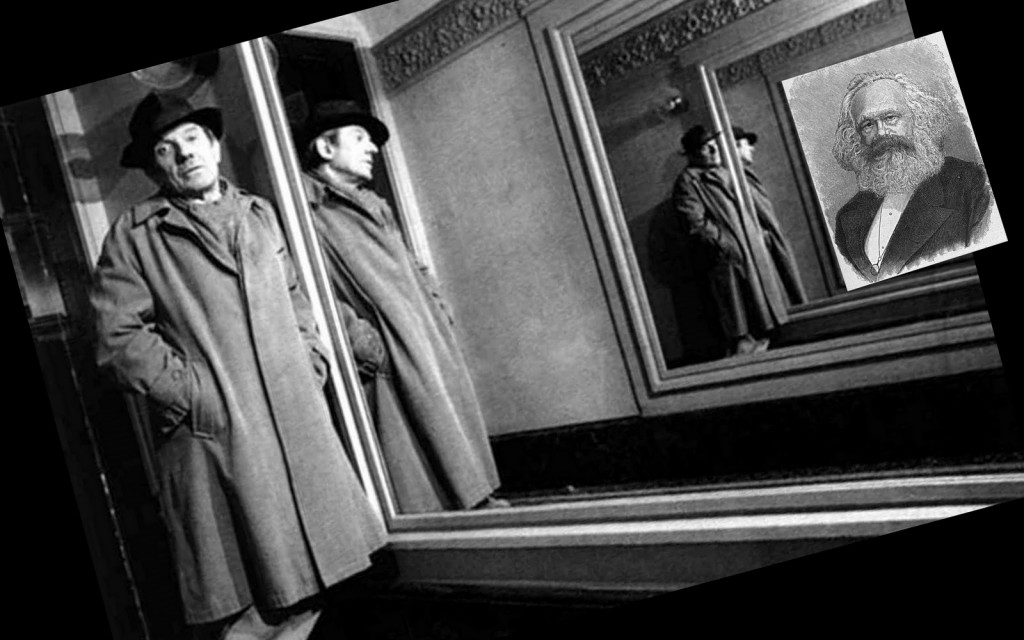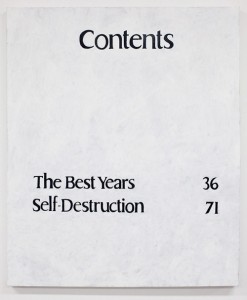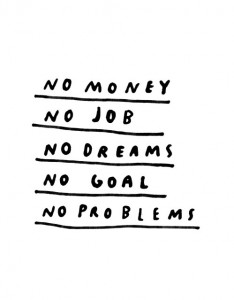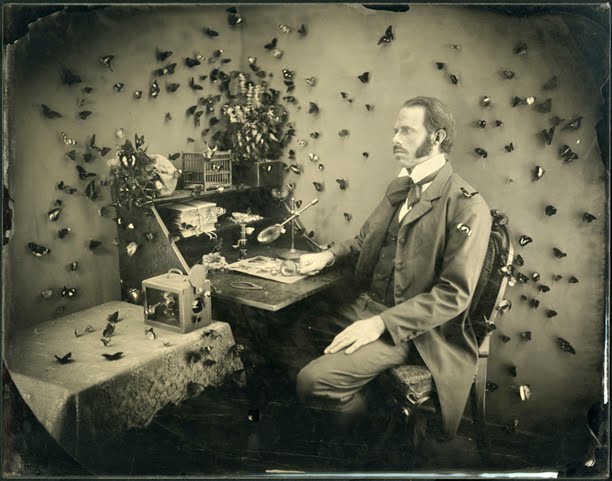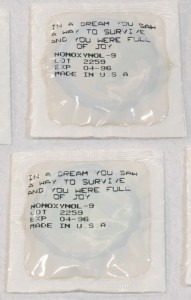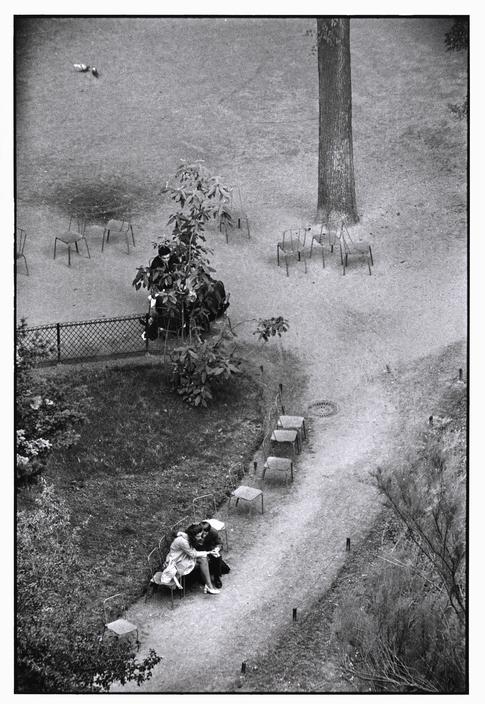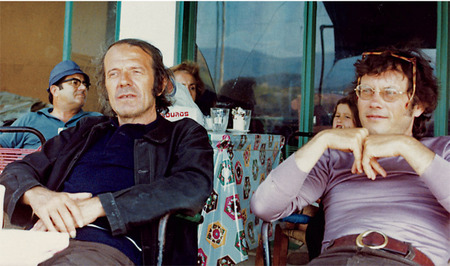
Virtuoso Machines: Deleuze + Guattari
Fadi Abou-Rihan is a psychoanalyst in private practice. He lives, works, and writes in Toronto. His most recent publication is “Deleuze and Guattari: A Psychoanalitic Itinerary” (Continuum: London and New York; 2009) This talk is from his visit to Centre of Gravity where he spoke about the important work of the French philosophers Gilles Deleuze and Felix Guattari. April 13, 2010.
It’s nice to be here but also a little intimidating because when Michael asked me to talk about Deleuze and Guattari, give a 101 spiel, I was partly thinking, “Oh joy,” and I was partly thinking, “Oh shit.” I’ve been reading these guys for over two decades, so the idea of compressing everything into a half hour talk is a little daunting. So perhaps it’s telling that I’m not a master of Deleuze and Guattari, because presumably if one has mastered the material one could give the kernel, the essence, in less than 30 minutes and be comfortable with that. What I would like to do is talk for half an hour and have a question and answer period. I would like you to interrupt.
For those of you who may not be familiar with these two guys… They’re French, one is a philosopher by training, Gilles Deleuze, the other is a psychoanalyst, Felix Guattari. By the time they met in 1969, Gilles Deleuze was already quite established as an academic. He’d published seven or eight groundbreaking manuscripts on Hume, Nietzsche, Bergson, Proust… his work was broad ranging in its interests, and at the same time incredibly learned and detailed in its analysis. His 1963 book on Nietzsche was a groundbreaking study that revolutionized the way the French read Nietzsche. All the big names you hear in French philosophy, Derrida and Foucault and Lyotard and company, owe a great debt to this very established philosopher. Deleuze was very much at the centre of the French philosophical scene.
Guattari was an analyst. He’d just finished his analysis with Jacques Lacan, the French Freud, an incredibly important figure in the history of psychoanalysis. I discovered recently that Guattari was tagged as the heir apparent to the Jacques Lacan throne. Until Jacques-Alain Miller came along and married Lacan’s daughter and basically stole the throne from Guattari, which didn’t leave Felix very happy. He was not at all interested in the academic world, he was a very hands-on, practical political figure in France. He was on the left of the left. Whatever issue came up that wasn’t left enough, you could count on Felix Guattari standing up and saying that this is not acceptable. He’d been practicing for about 20 years in what is now referred to as institutional psychotherapy. It’s a psychotherapy that is based on an understanding of the individual psyche, not as separate from a certain environment, but very much part of a context, which itself gets to be analyzed in the process. It wasn’t a one-on-one dynamic, but part of an institutional dynamic. Everyone gets involved. He was working in a clinic right outside of Paris that was famous for completely breaking down the barriers between doctors and patients, nurses and staff, everybody was involved in the therapeutic process. In the maintenance, in the care, in the direction of the institution. Guattari was already quite involved in that.
So we’ve got this incredibly learned, very well established academic on the one hand, and this very deeply invested pragmatic psychoanalytic professional on the other, who is also quite well known in his circles. Two established figures meet. Deleuze had heard of Guattari, and he pursued him in a sense. They meet in 1969, they start writing, thinking, brainstorming. And a couple of years later they come out with a text called Anti-Oedipus. I’m not going to give you a whole summary of the work, I’ll give you a taste, and you can carry it and see where you go.
Deleuze had already written about psychoanalysis, and he was actually attending Lacan’s seminars. In intellectual circles in France there is a tradition of the public seminar. Most of the big names that you hear about held regular weekly seminars that were open to anybody and everybody. Lacan’s seminars on Wednesdays were notorious for gathering the who’s who of the intellectual scene. The French intellectual version of People Magazine would have had a field day taking pictures of all the big name philosophers, intellectuals, writers, poets, artists, who flocked to his seminars. Deleuze had been following these seminars for quite a while. He’d written about Freud very positively, he’d talked about Freud reaching the heights of metaphysics, and how he was penetratingly insightful about human nature. When Anti-Oedipus came out it was a major event at the time. It appeared to be against everything psychoanalytic. It was a radical manifesto that opposed everything that psychoanalysis stood for, and by extension, everything that much of the French intellectual scene stood for at the time. That’s become the standard interpretation of the text.
If you’re at all interested in psychoanalysis, especially if you’re a clinician, which I am, the last thing you want to do is to read this text, because it’s the devil’s work. If you’re at all interested in Anti-Oedipus, if you’re a self-respecting Deleuze and Guattarian, then you would want to have absolutely nothing to do with psychoanalysis. These are two enemies and they shall never meet. I read this text over and over again, and wrote a big chunk of a PhD dissertation on it, and yes, Deleuze and Guattari are right, psychoanalysis fails, and is problematic on many counts. When I went into analytic training I was still convinced they were right, and developed a large split as a result. How can I – in all legitimacy and conscience and integrity – practice something that is presented in one of my favourite and most inspiring books as absolute kaka?
Simone Moir: Did Guattari continue to work in the field?
Fadi: Yes. He’d just finished his analysis with Lacan and started his private practice as an analyst, as well as being an institutional psychotherapist. Gradually he stopped his practice as an analyst, but continued to work at the clinic, and interestingly enough, he maintained his affiliation with the Lacan school throughout the 70s. He believed that regardless of the practice, or the people involved, there was something worthwhile in this way of thinking that needed to be nourished and furthered. That’s something people tend to forget. Oh he wrote this book, then stopped being an analyst, this is proof he didn’t want anything more to do with psychoanalysis. Deleuze was never a clinician and never entered analysis himself, he was really a philosopher who read thoroughly and deeply. He had a fairly radical shift in his views, from holding Freud in the highest esteem to thinking that he’d got almost everything completely wrong.
I had a bit of an epiphany one day, it was actually in a setting very similar to this one. I was thinking I was a famous person. I had my own seminar in Toronto. What we did was read Anti-Oedipus line by line. We spent a year and a half at it, and got through about 45 or 50 pages and then everyone left in exhaustion. It was quite the commitment. But in the course of reading and re-reading, it became apparent to me that in fact the criticism and the potency of Deleuze and Guattari’s project was not that they were countering psychoanalysis, but holding it to its own standards. They weren’t against psychoanalysis. They were the most thoroughly analytic by saying that it doesn’t measure up to its own expectations. But its expectations are worth nurturing. What they did, or at least the way I see what they’ve done, is to read psychoanalysis, psychoanalytically. From that perspective, the problem is not so much with analysis, but more with analysts, or a certain kind of analyst. So the anti, in anti-Oedipus, is not an opposition, but the other side of what is perhaps the same coin. Or if you want, it’s the ‘anti’ that is the ‘ante.’ The antechamber, the pre-analysis, the pre-Oedipal is quite important, quite relevant to think about.
But let me go back a little bit. Freud didn’t discover the unconscious. It was already discovered by the time he came along. Hypnotists were already assuming that there was something in each and every one of us that we were not aware of. That’s why they could make suggestions to people and then, post-hypnotically, trigger these suggestions. What Freud did in the 19th century was to say that the unconscious is not just the basement apartment of the psyche, but that in fact it’s a dynamic process, it’s a form of thought that is not always apparent to us. It’s always at work, and shows itself at intermittent points in our lives, via dreams, slips of the tongue, fantasies, bungled actions. Those sorts of experiences tell us something about the unconscious. And they tell us that it is a moving process. That the unconscious is not just a storage area, a deposit box where we leave things, and when we need them we go and retrieve them.
Freud argued that the unconscious is all about representation. So when we speak and make a mistake, when we dream, when we fantasize, when we accidentally “forget” things – what is really important to pay attention to, to try to understand, to try to analyze, is not so much the manifest expression, but what underlies that expression. In the dream what’s most important is not the images. I dreamt of a flying elephant and it was striped pink and blue, and there were polka dots and half of it was a horse, and then my grandmother came along. This is not really the most important part of the dream. These are the images, they are the manifest content. If we analyze the dream properly, this manifest content will lead us somewhere, it will tell us about something that supports these images. Much of what is going on is a representation of events that are happening on a deeper, more basic and much more powerful dynamic level, which for Freud was primarily an Oedipal dynamic. What is the Oedipal dynamic? The stereotype says that at some point, early on in our lives, we want to get rid of daddy and sleep with mommy, and also sleep with daddy and kill mommy, and negotiating that is incredibly hard, our mental apparatus struggles with that for years, and sometimes we succeed and sometimes we don’t. Everything that we experience in our adult lives is really a re-enactment of that scenario, and of all the troubles that we’ve had earlier trying to negotiate it.
The unconscious is a stage where the Oedipal trauma gets played out. You could be from Toronto, or Zimbabwe, Madagascar, living in the 21st century, the 4th century BC, it doesn’t matter. We all have the same kind of drama playing out on the stage of our unconscious. We may have different shades of it, the staging might be different, but ultimately it’s the same story. If we’re OK. But if it’s not the same story, or if that drama does not unfold, then we’re really shit out of luck. Psychologically, we are in deep trouble.
Deleuze and Guattari come along and say that is completely nonsensical. That is thoroughly wrong. The unconscious is not a representation. Remember how Freud argued that the unconscious is dynamic. It moves, it does things. Following on this thought, the opening line of Deleuze and Guattari, which is not in the least bit philosophical or psychoanalytic, states: “It is at work everywhere. It eats, it heats, it breathes, it shits, it fucks.” Not exactly what you would read in a philosophy text. And though analysts are all for talking about shitting and fucking, we usually don’t use those words. Defecation maybe. Maybe. Projection is another word, but not shitting. So right off the bat, “It is at work everywhere.” Not, “It represents an Oedipal drama that Sophocles coined because of his genius. He really spoke about it in the most eloquent way.” No, it is at work, it does things, it produces things. “It eats, it heats, it breathes, it shits, it fucks.” It’s not just a representation, it’s not a translation of something that is basic, that is universal, that turns into that flying elephant with the stripes and the polka dots and my grandmother thrown in for good measure. No, it actually produces things. And so they decide that in fact the most accurate way of describing the unconscious is by referring to it as a process of production. Not a process of representation, but of production.
It’s not a production for the sake of producing something, the way we think of production these days. Assembly lines will produce something and you sell it, and you make money, and everything is great. It’s a production that is actually straight out of Marx. It’s a production that is productive. It’s not about an object. It’s a production that is always consuming something before it produces. Most basic example: whatever it is you want to make, you have to start with raw matter first. Your process of production is going to consume that material, that raw matter. You consume wood in order to produce a floor. You’re consuming part of nature in order to produce something else. But it’s not just about consumption. It is a production OF consumption. You produce things, and in the process, you produce the way they are going to be consumed. Advertising is a very good illustration of this. Your life is not going to depend on whether or not you have an iPod, but advertising definitely creates the need for you to consume that. I’m all in favour of it. Production produces a way of consuming things, and a need to consume things.
Production is also about registration or recording. The moment you write something down, you register it. You’re not just taking stock, or taking account of, or replicating or representing something by writing it down. You’re also producing reality. A marriage certificate is not just a piece of paper, it produces two individuals with certain responsibilities, obligations, privileges and duties. It produces a way of being in the world. Oh they’re married. Oh they’re divorced. He’s still looking to get married. She’s done this 17 times.
If you go to university you have to register to be a student; you’re not a student until you’re registered, until it’s been inscribed somewhere. And that inscription produces a certain way of being, a certain expectation, a certain way of relating. You registered me as coming tonight to give a talk, didn’t you? Apparently on Facebook. I have no idea. Fadi is coming to give a talk. We’re all going to attend Michael’s workshop, and after that Fadi’s going to come and talk. So the expectation then is, not just the expectation, but the production, is something like this one. This room, all of us here, right? Where I talk, you listen, you think, who knows what you’re thinking, or if you’re thinking, or what I’m thinking? Something’s being produced. Oh, here’s a guy who knows about something and who is going to share his knowledge. And so certain roles and functions have been produced in the registering and recording of this event.
So Deleuze and Guattari developed this idea of production as always a production of production. A production of consumption. And a production of recording. It’s not just about putting an object out, it’s always more. And the consumption isn’t just a consumption of an object, but it’s a consumption of production. And it’s a consumption of recording. Same thing for recording. It’s a recording that consumes, it’s a recording that produces. This is not mental gymnastics, it is important for a tradition, and not just a psychoanalytic tradition, but in fact a very broad intellectual and cultural tradition that has identified human desire as lack. We want what we don’t have. We don’t have it, and when we have it, we have consumed it. This is who we are. Or so says this tradition. We are defined by what we want. We are defined as consuming beings, whether it’s consuming a product that’s been put on the market, whether it’s consuming an idea, or a text, or a practice, or a relationship. It’s all about what we don’t have and what we want to take in. Whether it’s mommy’s milk, or it’s the latest philosophical project, it’s all about consumption. Then these two guys come along and say no, you’ve got it wrong. Desire is not about lack, desire – another code word for production in their lexicon – is about producing things, not consuming things. Not taking things in, but putting things out.
The unconscious is not just a stage where things happen that are outside our control. It is something that we produce. Though it’s not as if one day we wake up and decide, “OK, today I’m going to have an unconscious, and my unconscious is going to produce.” No, it happens beside ourselves. And in fact, our sense of our selves, who we are, when we say, “I am this,” or “I am that,” or “I desire the other,” those utterances are productions as well. They are products of this process of production, consumption and recording. It’s very webby and tangled and messy, which is precisely what Deleuze and Guattari want. They want the messiness. Part of the problem with psychoanalysis as it had been practiced until then was that it was a little too simple, a little too easy. But it was easy in the sense that it reduced everything to one thought, one dynamic, one process, one way of doing things. In a sense, psychoanalysis had put the human psyche on a rail track and insisted that the psyche had to travel on that track and nowhere else. And if it deviates, if it gets derailed? Then it’s sunk into pathology. Of course, Deleuze and Guattari come along and say it’s precisely the derailment that gets us to produce things, that gets us to live. Not in the spirit of: “Long live schitzophrenia!” Or that people who get locked up in the mental hospital are the true radicals, which actually was the argument of a lot of anti-psychiatrist movements of the 1960s and 1970s. But by being derailed, we produce things. Meaning, that by interrupting what’s already happened, we get to actually live. Think of poetry. Poetry is a brilliant example in this case, because poetry is not just words strung in the same way that you and I would string them together, in fact, it’s the gift of the poet to be able to take words that we all know, and derail our use of them. Poetry uses words in radically different ways from what we’re used to. That’s the genius, that’s the creativity of the poet. That’s the productive mode of the poet. If everybody used the same words, in the same way, all the time according to the same rules, with the same expectations, we wouldn’t have language. We would have programming code but we wouldn’t have language, and we would all be CPUs as opposed to human beings.
Think in the broadest sense about history. If we did the same thing over and over again, moving in one direction, without deviating, not being derailed, not changing anything, then we don’t have history. But think revolution. Think events, any kind of political event, any kind of historical event. The fact that it is an event, as opposed to yet the same thing, over and over, the fact that it stands out as an event, that it stands out from everything around it, is about that track being interrupted. The machine that is traveling along that track is derailed, and taken somewhere else. One of the most confusing things that Deleuze and Guattari say is, “A machine works only by breaking down.” What the hell is that? If a machine is broken down it isn’t working. Deleuze and Guattari say that a machine works when it gets derailed, when it’s not performing what it’s supposed to perform and nothing but. Otherwise, it’s not working. Poetry wouldn’t be poetry if the words in it were used the way we use them.
Simone Moir: What is being described as working? Health, sanity?
Fadi: No, neither. The unconscious. The very fact of being human. Desire.
Simone: So derailing is the process of the unconscious? I’m starting to get a sense that this is optimal, even desired. Derailing sounds like something to be desired.
Fadi: They’re not setting up an agenda. They’re not saying, “Listen people, we’re all on the same track and let’s derail.” Although some have read them as doing that, and I think to a certain extent they fall into the trap of sometimes thinking they were doing that. People have asked: what are the applications of their work? How can we be Deleuze and Guattarian? How can we be anti-Oedipal? I’m of the opinion that they are describing a fact that is already here. We derail all the time. Striking up a conversation with someone on a bus. Having an unplanned thought. That’s a derailment in a sense, having an ah ha moment, now it makes sense, now I understand.
Simone: It sounds like an argument for spontaneity.
Fadi: Spontaneity not as a project, but as a fact. You’re raising a very important point because one of the big questions in that context is what do you do with that? Can you foster spontaneity? How in heavens name do you foster it? OK, let’s be spontaneous people. It doesn’t work. It can’t work. One of the things that they’re arguing is that this process of production is not just about tape recorders or an event like this one, but it also produces identity. Including the identity of the “I” who says, “I am going to be spontaneous now.” That’s a product, it’s not basic human nature, that “I,” that utterance, that capital S, Subject. So you’ve got a real dilemma here. How can you script something, when in fact the very scripting is a product? It’s not nature. It’s something that’s added on. It’s not necessary. And so their basic argument is, for instance, not that Oedipus doesn’t exist, or the fantasy of having sex with one parent and killing the other and vice versa. It’s not that it doesn’t exist. That it’s all bogus and Freud made it all up, who knows what kind of perverted fantasies he had that he couldn’t deal with so he projected them on everybody else. But in fact those fantasies are very real, and they’re very true, and you see them all the time. But to state that they are necessary and they are the fundament of what it means to be human, that’s the problem. They become the single track. It’s not that Oedipus is wrong, it’s not that that kind of dynamic never existed, but the idea that it is the standard by which everything needs to be measured, that it is the standard of pathology, the standard of health, the standard of what it means to be human at all, that’s the problem. So it’s not hurray, no one wants to do anything to their parents anymore, if you’re a Deleuze and Guattarian. But they are saying: this is not our fate.
It’s like saying capitalism doesn’t exist. Well duh, it does. But the idea that we are doomed to it, and this is the only way, and that if we’re not living in this kind of environment then we are pathological, that’s a different argument altogether. There are all sorts of other possibilities. And those other possibilities are not only hypothetical. In fact, a lot of what they’re trying to do is to show that that Oedipus was never our collective fate. There are other ways of being, other sorts of dynamics that we all actually live that are not Oedipal.
One element of their broad project is the idea of synthesis and machines. Machines… not just a recording machine but any kind of coupling. My mouth uttering words that your ears hear is a machine. Something is being produced by one machine, and it’s being consumed by a host of other machines. And it’s having an effect, or not, but it’s produced something in your minds: thoughts, associations, recollections, surprise, boredom, affects; all sorts of emotions, who knows? The coupling of two machines constitutes a synthesis for Deleuze and Guattari. This is the synthesis that doesn’t just exist externally, but also operates at the level of the unconscious. Different ideas, different thoughts, experiences, memories, they all get to be coupled with one another.
They identify three different kinds of connective syntheses. The first adds one machine to another: it’s this and that. The second synthesis is called disjunctive and distinguishes between this or that. And the third synthesis they call the conjunctive synthesis. By that they are referring to a moment when these machines are coupled and there’s a lightbulb moment that goes ah, so this is what it means. One person is talking, the other is listening, and there’s a spark, there’s understanding. Their argument against psychoanalysis is not that psychoanalysis hasn’t thought of these syntheses, and now they are coming up with a new theory of how the unconscious works according to these three syntheses. But psychoanalysis has ossified these syntheses. What do I mean by that? The connective synthesis is much richer than this and that. It’s this and that and that and that and that. It’s an endless series. So as opposed to mommy and daddy and me which make up the classic Oedipal triangle, from the point of view of the little child, it’s mommy and daddy and the guy next door and the fantasy and the teddy bear and on and on. So the very idea that the Oedipal constitutes the primal mommy, daddy, and me and nothing but, has opened up. You’ve now got a geometrical figure of 1001 different points. The disjunctive synthesis of this or that is opened up.
Classic psychoanalysis states: you are either masculine or feminine, for instance. You’re either neurotic or psychotic. You’re either healthy or sick. That’s mutually exclusive disjunction. They don’t say the disjunctive synthesis is wrong and Freud didn’t know what he was talking about, and neither did Lacan, and we are going to tell you the truth of all of this. The disjunctive synthesis is very much at work in the unconscious, but it’s not limited to two choices. In fact, it’s quasi-infinite.
The third synthesis, the lightbulb moment when understanding coalesces, when things make sense, is the basis for understanding who we are. Now I know who I am. Little Suzie at the age of six understands, “I am a little girl and I am going to grow up to be just like mommie. That’s me.” Or little Johnny says, “I am going to be a fireman, and that is me.” It arrives in a lightbulb moment. Psychoanalysis reifies and fixes it, insisting that’s how it is, that’s how it’s been, that’s how it’s always going to be. Deleuze and Guattari introduce noise into this production of the “I.” When do we produce the I? Whenever we announce, “I am a man,” or “I am a woman,” or “I am talking and you are listening.” For Deleuze and Guattari, the “I” becomes a subject for change.
They are not suggesting a different way of understanding the unconscious, they’re saying that analytic understanding has a kernel of truth to it, and what needs to happen is to extend that, to open it up, to make it less rigid, less ossified. And in my way of reading it at least, they are saying that’s what Freud wanted, but could never do, and that’s precisely where he betrayed his own project. By stopping. By saying it’s this or that. By fixing the Oedipal drama, for example. All these elements that Deleuze and Guattari are putting forward: this openness, this uncertainty, this constant transformation, this derailment – these are not foreign to psychoanalysis as ways of looking at the psyche. They are, in fact, very much part of the analytic project. But analysis became a little too comfortable. And analysts became a bit too comfortable, and betrayed their own highly challenging and radical origins.
Michael Stone: I have two questions that are perhaps related. It seems that in all of us there is this tendency to think in a binary way, in terms of opposites. I like it, I don’t like it. I want to get near it, I want to get away from it. It sounds like what they’re saying is that the unconscious by nature offers so many other possibilities. Or creativity by nature offers so many possibilities. The other thing I’m wondering about is why do we even need to call it the unconscious? It makes the unconscious appear to be something that happens inside of us. But the unconscious also happens outside of us, in events and coincidences.
Rami: “It is at work everywhere.” I sound like I’m quoting the bible. Or another holy book of choice. “It is at work everywhere.” Those were their first words. You’re absolutely right. The thing about: I like it, I don’t like it, is that psychoanalysis never suggests it’s that simple. In fact, one of the recurring themes in analytic work and literature is ambivalence. I like it AND I don’t like it at the same time and for the same reason. If I like the way it’s shaped, but I don’t like the colour, I can go away and recolour it and the problem is resolved. But psychoanalysis suggests that I love it and I hate it for the same reason, so if I get rid of the reason why I hate it, then I get rid of the reason why I love it, and then I am in deep trouble. It’s called ambivalence. That’s what goes on in the unconscious most of the time. The alternating current of I like it or I don’t like it, that’s the manifest way of containing that ambivalence, of managing it, of making it more bearable.
Simone: And it’s a shuttling back and forth, isn’t it?
Rafi: Yes, but let me complicate things for you. Both love and hate are happening at the same time. It’s not that I like it today because it’s blue, and tomorrow I’ll hate it because it’s blue. The binary thinking – it’s either this or that – in analytic terms is very much a secondary process. The primary process is the unconscious ambivalence. That’s where all the meaty stuff is. The secondary process is the part we all know, that we all live with, that’s the binary logic. Deleuze and Guattari argue that the reason Freud betrayed his own project is that he brought the binary thinkings and laws of consciousness and foisted them onto the unconscious. Either masculine or feminine, either mommy or daddy. Either active or passive. Either have something or lack something. Either produce or consume. That exclusive either/or has been foisted on the unconscious, but it’s still the unconscious that Freud himself had coined.
Where is this unconscious? It’s not inside, although that’s what modern neuropsychology is saying, that there is a part of your brain hosting neurotransmitters that are the centre of thought or taste or desire. Unfortunately a lot of analysts are jumping on that bandwagon and saying, ”Psychoanalytic treatment of Post Traumatic Stress Disorder has been proven to be correct because now we have MRI studies that show that the person who has suffered from PTSD has one kind of MRI picture, and after they’ve been through analysis they have a completely different MRI picture. Therefore analysis is important.” Well, do we really need the pictures? Not really.
Ronit Weisz: What is ossifying? It seems to me that if the unconscious is at work everywhere, the idea of it ossifying is something superimposed.
Fadi: The ossification is very much part of it, yes. That’s why I said there their project is not to do away with Oedipus, Oedipus still exists, but it’s not the only track. It’s not forever and ever. The trick for Deleuze and Guattari is to figure out where ossification is happening, and most importantly what it’s doing. Not what it means.
The traditional analytic question is: what does this mean? What’s the underlying dynamic. This is at best a representation. What does it mean? What does it represent? What’s underneath it, what’s the deep, underlying, psychological dynamic? All this is manifest content. I’m an analyst and I’m listening, and I’m listening, and I’m listening, and I’m thinking, Ah! This what my analysand is saying. Not what she or he is actually uttering, but there’s another meaning underneath that, an Oedipal drama, that’s been stunted, derailed, sabotaged… Or else it’s gone perfectly smoothly now that he’s been in analysis with me for nine years.
The practice that Deleuze and Guattari are proposing instead is named schizoanalysis. Note that analysis is still there, the word remains. The driving question in their form of psychoanalysis is not what does it mean, but what does it produce? What’s it doing? Not how can I undertake an analysis that will go back into history and understand some earlier trauma, or deficit, or conflict, and try and bring it to consciousness, or try and resolve it, or try and gratify it. Their most important question is: what is the analysand doing with these words? What is this chain of associations doing in the session, what’s it producing? Not what does it mean. Let’s take as an example TV talk show host Janine Graflow referring to some actor, I forget what her name was, but she was named a bwitch. Graflow meant to say “the blonde bitch.” But she conflated the two words and it became a slip she wasn’t planning. Analytically you might say well, Graflow didn’t want to call this person a bitch because she was being polite. Or maybe she didn’t want to get censored, or she censored herself, and so instead of saying blonde bitch she said bwitch. You take the slip and you try to figure out what produced it. What was underneath it. And you look for the censorship that produced it, that made it possible.
Schizoanalytically, the question is not what does this mean, but what is it doing? Now that she’s uttered this strange set of sounds, what effect is she producing in her audience, in herself, in language? Did she create a new word all of a sudden, is this word going to appear in the OED? Maybe, maybe not. Who knows? But what kind of effect did she produce? Again, in the person who’s watching her, in her self, in the whole structure that is performer, audience, television, etc. So instead of looking back, or down into the depths, and trying to figure out the roots of where they are, the perspective has changed. Now that the word has been spoken, what effect has been produced. It’s not about resolving conflicts or making up for deficits, or going through the same process again but this time in a healthy way because this time there’s an analyst in the room, as opposed to a not good enough mother or an absent father. But now that it’s happened, what’s next?
I’ve presented this as a dichotomy. Either it’s psychoanalytic or it’s schizoanalytic. You could say I’m not practicing what I’m preaching. It’s either Freud and company or Deleuze and Guattari. But in a sense, what they are saying, rings very true. Clinically, for instance. When you’re in a session, if you’re an analyst, you open your mouth as the oracle of truth and you say something. “Well I think.” “What I’m hearing is…” Or whatever. What you’re looking for is not the analysand replying, “Oh yes doctor, you’re absolutely correct.” You’re looking for what your analysand is going to do with that. What’s their next association? It’s not the truth that matters, and this is not Deleuze and Guattari, this is the mainstream analytic approach to very basic clinical experience. It’s not about, “I was right after all” or “Oh shit, I spoke too soon, I misspoke, I need to correct myself.” But instead: what did my interpretation produce? Did it produce more associations? Did it unsettle the person who is lying down on the couch? Did it make them think of some other things, that they wouldn’t have thought of otherwise? Did they go quiet in a pensive way or have they become angry because I’ve said something that’s upset them? Or did they just get up and leave? It’s not the actual truth of the analytic utterance that counts, it’s what happens after. And again, there’s nothing Deleuze and Guattarian about this that analysis isn’t aware of. It’s clinical training 101: don’t be too in love with your own words. Listen to what affect they have on the analysand. Pay attention not to what you’re thinking, and how you’re trying to deliver it to them. You see how smart I am, I’ve figured out your problem. No, listen to what’s going to happen next. It’s always about what’s going to happen next. Analytically it makes perfect sense.
What is my utterance, as a machine, what is it going to produce? I have no way of telling. Most of the time. Sometimes I can say to myself, “I think this is going to upset my analysand, it’s probably very difficult,” and I may in fact say, “What I’m going to say may actually upset you, but I think it’s important, this is what I think…” Aside from those kind of very specific situations, I can’t predict what’s going to happen. It’s a surprise, it’s always a surprise. My job is not only to declare the truth, assuming it is in fact the truth, but to see what happens next. And that’s going to tell me a lot more than my precious truth. So in a sense, if you haven’t had any encounter with Deleuze and Guattari, and you’re practicing analytically in this most basic of ways, you are treating your own presence in the room as a machine, and what it does and what it doesn’t do, and recognizing that you’re producing things. Your words are being consumed by someone’s ear, and they’re triggering all sorts of associations, and vice versa.
Question: I’m wondering what would they do with the Lacanian tri-partite model of the Real, the Imaginary and the Symbolic?
Fadi: As I mentioned, Guattari did his analysis with Lacan, and he was very influenced by him, and Deleuze was also one of his regular audience members. They argue with what Lacan did with the Symbolic – this structure that exists outside of each and every one of us, in which we exist. Lacan presented the Symbolic as a certain kind of truth that has its own laws that we do not choose to obey or disobey. For example, the law of the fact of the unconscious. Or the law of language. The fact of language. Or the laws that govern the basic structure of language. We may choose to speak in a grammatically correct or incorrect way, but the fact remains that there are certain basic laws of language – metonymy and metaphor for instance – that we cannot help but use. They predate each and every one of us, they’re what makes us human, our participation in these laws makes us human. Or the law of difference, sexual difference for instance. These are all different versions of the capital s Symbolic, in Lacan’s world. Very much like the Freudian Oedipus, it’s immutable, you can’t fiddle with it. For Lacan, it’s a fate of sorts, and you either have it or you don’t. And if you don’t have it, you’re severely limited in your psychological functioning. The verdict is in, the Symbolic hasn’t been installed, psychosis is the diagnosis. Which doesn’t mean delusion by the way. Deleuze and Guattari’s response is: here we go again. Here is another idea about a universal structure that makes rigid a psychology that is much more subtle, malleable, flexible. For Lacan, the Symbolic is beyond any kind of intervention. It is there. Deleuze and Guattari’s response is that the Symbolic is mutable, you can do things with it. And the question is not whether it is or isn’t there, but what are you going to do with it? What is it doing with you?
The Phallus is the Law of sexual difference, of power, of gender identification. Not biological identification, but gender identification. It is perhaps the most familiar expression of the Symbolic, it’s yet another version of it. Deleuze and Guattari argue that we’re not only masculine or feminine, we’re masculine and feminine and somewhere in between, and something else altogether. Elizabeth Grosz has a really nice essay with a wonderful title, “A Thousand Tiny Sexes.” And that’s what it’s about. Not two. But a thousand tiny sexes. Parts of the body are masculine, others are feminine, other parts are neither. Lacan would say, “Sorry, the phallus exists, and if you can accept that fact you can lie down on the couch. If you don’t accept that it’s there, you can still be in analysis…” Which is a radical move for Lacan. To take “psychotics” into analysis, but you can’t lie down on the couch, we’re doing it face to face. Lacan doesn’t need you to swear allegiance to the phallus or anything, but it shows up in the way you talk, relate, fantasize, behave… whether or not it is installed in you, that’s what counts. You can be the most rabid anti-phallic ideologue, but you can be incredibly phallic in the way you are rabidly anti-phallic. “No, dammit, the phallic does not exist! That’s the law!” You can’t be more phallic than that.
Ronit: Do they talk about health and cures?
Fadi: They do talk about health and cures, but not in the way that you would expect. One big question in the history of psychoanalysis has always been: what is the aim of psychoanalysis? What’s it supposed to do? There’s been a big divide, and on one side are those who approach the practice using a medical model. There’s something wrong with you, so you enter analysis and emerge a few years later healed, the way you would as if you had a broken leg set in a hospital. There’s quite a rich and subtle literature that follows that line of thinking. But there’s another line of flight in psychoanalysis that suggests that analysis has nothing to do with a cure, it’s about a certain way of thinking, a certain way of being, a certain way of understanding. Analysis doesn’t necessarily make you feel better, that’s the task of psychotherapy. Analysis is about a certain self knowledge which can often be quite painful to recognize. In the long run these recognitions are beneficial, so the cure isn’t given up entirely, but analysis isn’t about fixing things. “I’m sad doctor, make me feel better.” If that’s the problem go take an antidepressant. It’s faster, easier, quicker, cheaper. Analysis is a way of anchoring oneself in oneself, and in the world. And there’s no utility to that, right? It’s like asking: do you read literature because it’s curative? Of course, it is healing to a certain extent, but is that why we read? Is that why we enter analysis? No, it’s something else. It may have that kind of effect, but it’s about a certain way of looking at the world. Of understanding and situating oneself. Freud was famous for saying that analysis was not about being happy, it was about changing misery into unhappiness. Deleuze would argue against speaking explicitly about a cure, because the assumption follows that a situation will be fixed. But that doesn’t mean psychoanalysis has no purpose at all. But its function is not about improvement. Guattari is quite clear on this. It’s about agility. It’s about being able to manoeuver through different experiences. It’s like being a piano virtuoso who can play anything. It doesn’t make you feel better. You don’t become happy because you’re a virtuoso. But you can play whatever piece is presented to you. If you’re lucky, you may even be able to write new music. Your fingers are agile, your psyche is agile, you can get derailed without it being devastating. And the derailing can actually be painful, but it’s not The End, you can actually make it do things. That’s the kind of health or cure they’re talking about, the cultivation of a certain agility.
Agility is the ability to manoever, and associate, and drift, and be open to the unexpected. Which doesn’t mean that you stop being upset, or hurt, or surprised, but you can tolerate the surprise. You can fall down and break skin, draw blood, be scared, but you’re not paralyzed. OK. Pick up and you move again. Or you may not move again. You may plunk your ass down there and cry for a couple of hours. Fine. That can be part of the agility, that it’s OK to not be so bloody sensible and responsible, and to make a scene. But the crying occurs with a certain agility. It doesn’t go on for the rest of your life. There is a certain ability to move out of that state and not get stuck in it. This agility, this movement, is also a measure of health, it’s who “I” am. This agility admits the possibility that I might not know, that I may be surprised. Pleasantly and unpleasantly so. At the moment when I least expect it. Even a virtuoso makes a mistake. All the time. Every time. Virtuosos are not flawless or without error. But the virtuoso has agility. They can keep playing.
Michael: Fadi, I think we should wrap up here because some people need to get back to their institutional lives.
Fadi: Like dinner?
Michael: Yes.
Fadi: Thank you for listening.
